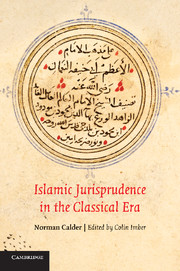Book contents
- Frontmatter
- Contents
- Editor's Preface
- Introduction
- 1 The Ḥanafī Law on Fornication
- 2 Nawawī and the Typologies of Fiqh Writing
- 3 Scholars, Muftis, Judges and Secular Power: The Need for Distinctions
- 4 The Social Function of Fatwas
- Afterword: Scholarly Priorities and Islamic Studies: The Reviews of Norman Calder (Robert Gleave)
- Principal Sources Used
- Index
3 - Scholars, Muftis, Judges and Secular Power: The Need for Distinctions
Published online by Cambridge University Press: 04 May 2010
- Frontmatter
- Contents
- Editor's Preface
- Introduction
- 1 The Ḥanafī Law on Fornication
- 2 Nawawī and the Typologies of Fiqh Writing
- 3 Scholars, Muftis, Judges and Secular Power: The Need for Distinctions
- 4 The Social Function of Fatwas
- Afterword: Scholarly Priorities and Islamic Studies: The Reviews of Norman Calder (Robert Gleave)
- Principal Sources Used
- Index
Summary
Introduction
A mufti is a scholar who responds to specific questions about the law, different therefore from the writing jurist who gives a general and structured assessment of the law. The mufti's response is a fatwa, the questioner or petitioner, a mustaftī. The task, or process, of giving a fatwa is iftāʿ. A fatwa can be sought and given orally, but, more typically, the question is given in written form and a written reply is elicited. The two components of a written fatwa are the masʿala or question and the jawāb or answer. As a written item, the combination of masʿala and jawāb is called a fatwa, though the term might more strictly be applied only to the jawāb. In some contexts, it was necessary to distinguish the ideal fatwa – which could be issued only by the highest ranking jurists – from the actual practice. In this case normal linguistic usage was deemed to describe an imperfect realisation of the ideal. The processes of iftāʿ, when analysed, were always found to depend on hierarchy, a grading of scholars according to their knowledge, the lower grades dependent on the higher grades. The highest grades were invariably located in the persons of the founding Imams and their companions.
- Type
- Chapter
- Information
- Islamic Jurisprudence in the Classical Era , pp. 116 - 166Publisher: Cambridge University PressPrint publication year: 2010



